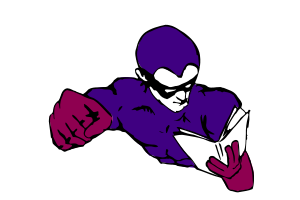 Image via Wikipedia
Image via WikipediaWhen you think of super-heroes, you probably think of Batman swinging across Gotham City and punching The Joker in the face.
Or you think of Superman flying high above the Capitol, bearing the American flag.
Or Spider-Man cracking wise as he bundles criminals in webs and leaves them for the cops to find.
All indelible images. But that’s not the whole story.
Yes, super-heroes stand for truth, justice and the American (or Krytponian or Asgardian) way. But they also stand for much more.
My novel in progress, The Power Club, started with the idea of kids having super-powers. I did not call them “super-heroes” because I wanted to avoid the clichés that people think of when they think about super-heroes. But when I’ve described my novel to others, they inevitably associate the concept with super-heroes.
This, I’ve learned, is not necessarily a bad thing.
Furthermore, my main character, Damon, wants to turn his super-powered friends into heroes. Why he wants to do this is central to our understanding of super-heroes and why they matter.
Adolescent Power Fantasies? Yes and No
Super-heroes represent our primal need for three things: power, authority, and acceptance. Children become aware of their own power (or lack thereof) the first time they encounter a bully. They become aware of authority early on, and when teachers, police officers, or other adults fail to protect them or to seek justice on their behalf by punishing said bullies, they become aware of the limits of authority. They also learn early on that, in order to gain acceptance from other kids, they usually have to learn the pecking order and change their identities (including their interests or the way they dress) in order to “fit in.”
Super-heroes paradoxically help children both deal with the harsh realities of life and to escape from them. They do so by offering elaborate fantasies in which the kid has power, can fill in the gaps of authority, and wins acceptance from the general public or other super-heroes.
But the appeal of super-heroes does not stop at childhood.
Adult Power Fantasies and Male Ego Trips
Super-heroes continue to influence and inspire us even into adulthood. Consider just about any movie Arnold Schwarzenegger has ever made. Sure, he doesn’t wear a cape or bend steel with his bare hands (except, perhaps, in the Terminator films), but he’s a super-hero, nonetheless. Perhaps “action hero” is the more acceptable term, but it’s the same thing.
Consider Chuck Norris (whose martial arts expertise is portrayed in films as almost super-human), Jean-Claude Van Damme, and Will Smith (in certain roles). They all accomplish the seemingly impossible, endure horrendous physical abuse, and win over crowds by triumphing over the forces of evil.
Super-heroes all.
What about Women?
Someone recently told me that girls get short shrift as super-heroes, and, unfortunately, she was right. As recently as 2007, Warner Bros. slighted girls when it marketed Happy Meal toys at McDonald’s to tie in with the cartoon series Legion of Super-Heroes. The LSH is a team that contains at least ten super-heroines, but none of them were marketed as toys.
Furthermore, female super-heroes often endure story lines that undermine or destroy them as super-heroes. Batgirl, in the famous Killing Joke comic (1988), was shot and crippled by The Joker. Now she’s the wheelchair-bound computer genius known as Oracle.
But in some ways, these stories mirror the struggles women face every day: glass ceilings, lower wages than their male counterparts, and sexist attitudes in a culture that is still coming to terms with equality. Super-heroes, therefore, have something vital to say to women as they do to men.
So, why do I write about super-heroes and why should you care? Because, in essence, every story is about someone facing the challenges super-heroes face: understanding power, dealing with authority, and seeking acceptance. No other genre brings this struggle to life as vividly or in such clear-cut terms.
Who are your favorite super-heroes and why?




2 comments:
Great post Greg. You are absolutely correct when you compare Super Heroes to the every day challenges that we all face in regards to power, authority and seeking acceptance. I had to deal with this for almost four years as a female Supervisor in charge of 16 men. Whew! Interesting.
@ Kristi
As a professor, I get to experience the other side of power, authority, and acceptance now, but, ironically, none of those things get any easier. For this reason, I think super-heroes are even more relevant to me now than they were when I was a child.
Post a Comment